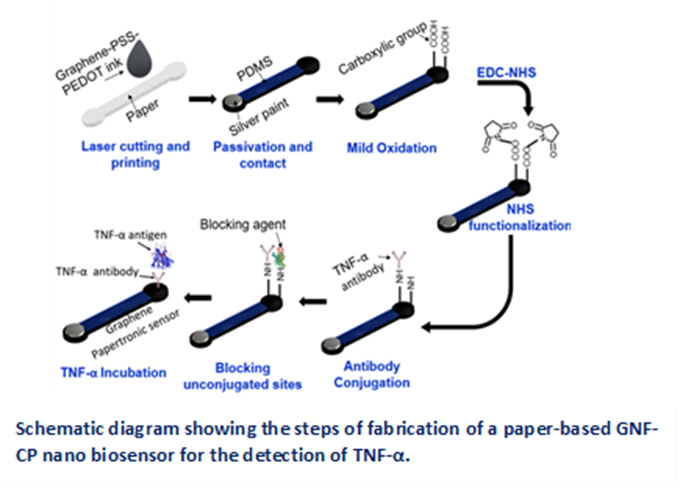

Invention Summary:
Cytokines are a class of regulatory proteins that are important physiological and pathological markers commonly used for the prognosis and diagnosis of diseases such as cancer, Alzheimer’s and rheumatoid arthritis, as well as for monitoring responses to injuries.
Researchers at Rutgers University have developed a novel method for fabricating paper-based nano-biosensors for the detection of cytokines using a conductive ink composed of graphene nanoflakes (GNF) and a conductive polymer (CP). Compared to existing paper-based biosensors, this technology ensures uniform dispersion of the conductive ink on the paper. This research paves the way towards developing economically viable and flexible paper-based biosensors for sensitive detection of cytokines. For detection, label-free electrochemical impedance spectroscopy (EIS) is used, making this technology suitable for point-of-care and at-home applications. Proof-of-concept studies have demonstrated that the sensitivity of the nano-biosensor is in the pg/ml range for TNF-a detection.
Advantages:
- Low cost
- High sensitivity
- Flexible, quick, and easy detection of cytokines
- Environment friendly, biodegradable
- Suitable for point-of-care and at-home applications
Market Applications:
This method can be used to develop low-cost, disposable biosensors for point-of-care and at-home applications:
- Detection of biomarkers for diseases such as Alzheimer's, different types of cancers, etc.
- Monitoring cytokine levels in patients undergoing treatment for cancer or other diseases that induce a severe cytokine response.
Intellectual Property & Development Status: Patent pending. Available for licensing and/or research collaboration.